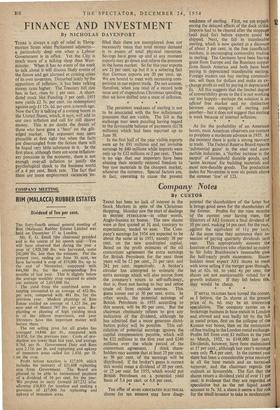Company Notes
By CUSTOS THERE has been no lack of interest in the Stock Markets in spite of the Christmas shopping. Monday saw the start of dealings in BRITISH PETROLEUM—in other words, Anglo-Iranian ex bonus. The new shares were at first quoted at 34 and, contrary to expectations, tended to ease. The Com- pany's earnings for 1954 are expected to be about the same as in 1953, namely 38 per cent. on the new quadrupled capital. Based on the profit estimates of the oil consortium agreement the extra earnings for British Petroleum for the next three years will be 12 per cent., 21 per cent. and 264 per cent. respectively. A broker's circular has attempted to estimate the extra earnings which will also accrue from the company's return to self-sufficiency, that is, from not having to buy and refine crude oil from outside sources. This guess comes out at 30 per cent. extra. In other words, the potential earnings of British Petroleum in 1955 according to this source, will be 80 per cent. But the chairman obstinately refuses to give any indication of the dividend, although he has admitted that a more generous distri- bution policy will be possible. This cal- culation of potential earnings ignores the capital compensation payable, which will be £32 millions in the first year and £240 millions over the whole period of the consortium agreement. I think share- holders may assume that at least 25 per cent. to 30 per cent. of the earnings will be distributed. If the broker's guess is correct this would mean a dividend of 20 per cent. or 25 per cent. for 1955, which would put British Petroleum on a potential yield basis of 5.4 per cent, or 6.6 per cent. * * THE Offer of seven ASSOCIATED ELECTRICAL shares for ten SIEMENS may have disap- pointed the shareholders of the latter but it brings good news for the shareholders of the former. Profits for the nine months of the current year having risen, the directors of AEI- forecast a final dividend of 10 per cent. making 14 per cent. for the year, against the equivalent of 111 per cent. At the same time they announce their in- tention of paying quarterly dividends next year. This appropriately answers the Institute of Directors who objected so rudely to Sir John Braithwaite's reasonable plea for half-yearly profitstatements. Share- holders must expect 'AEI shares to meet with some selling if the merger goes through, but at 62s. 6d. to yield 4i per cent. the shares are not unreasonably valued for a growth industry. If they fell below 60s. they would be cheap.
If METAL TRADERS have turned the corner, as I believe, the 2s. shares at the present price of 6s. 6d. may be an interesting speculation. The company carries on a brokerage business in base metals in London and abroad and was badly hit by the fall in metal prices, first on the collapse of the Korean war boom, then on the restoration of the trading in the London metal exchange. Profits fell from over £1 million in the year to March, 1952, to £148,000 last year. Dividends, however, have been maintained at 37 per cent., although last year's earnings were only Pi.4 per cent. In the current year there has been a considerable price recovery in all the base metals and an increased turnover, and the chairman regards the outlook as favourable. The fact that the shares return a dividend yield of over 11 pet cent. is evidence that they are regarded as speculative but as the net liquid assets amount to 5s. 3d. a share it seems a fair risk for the small investor to take in moderation.


























 Previous page
Previous page